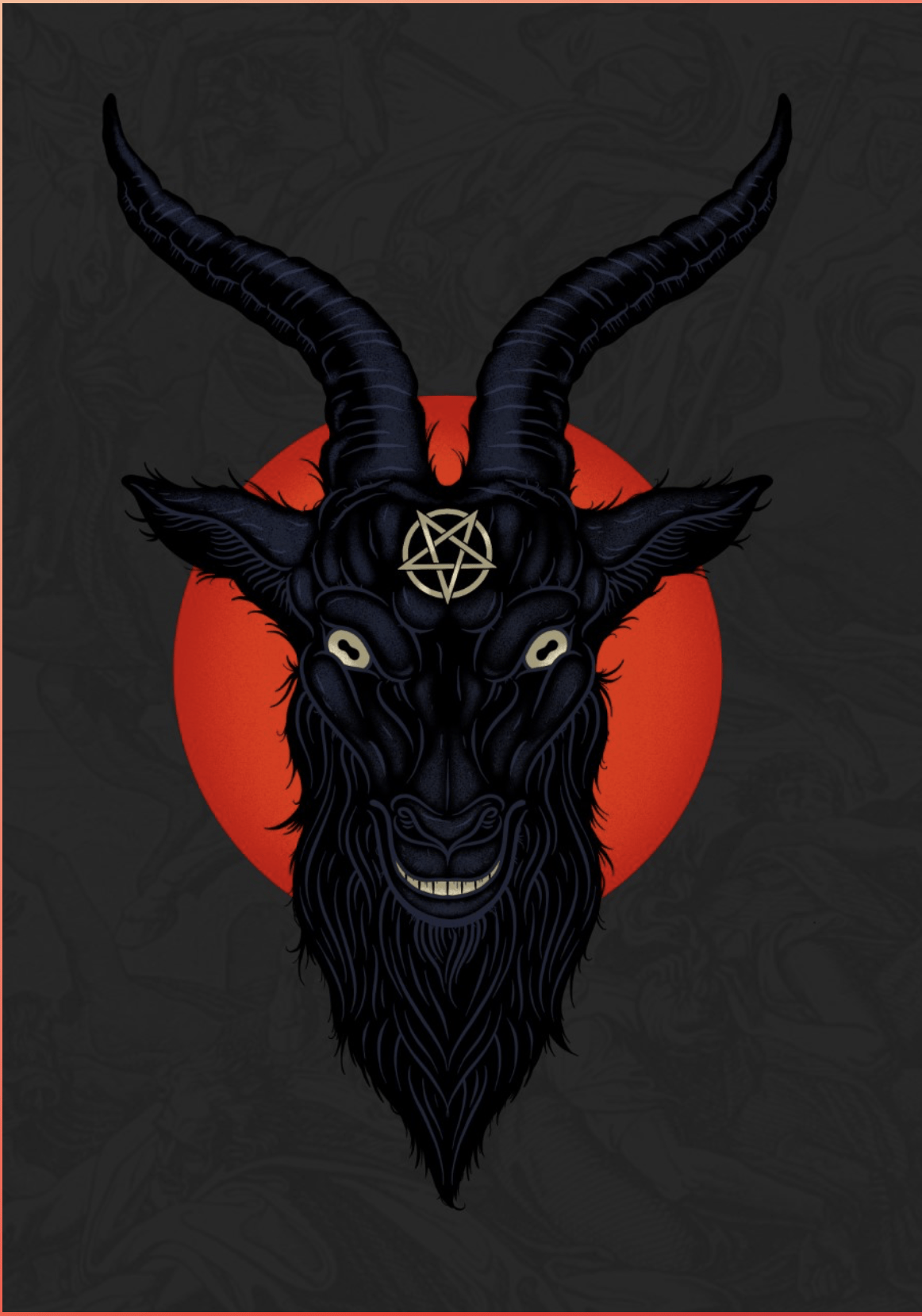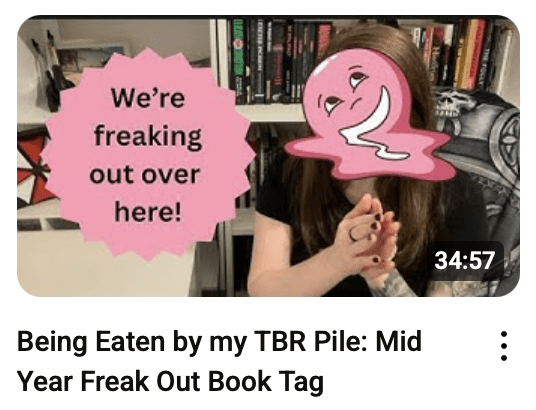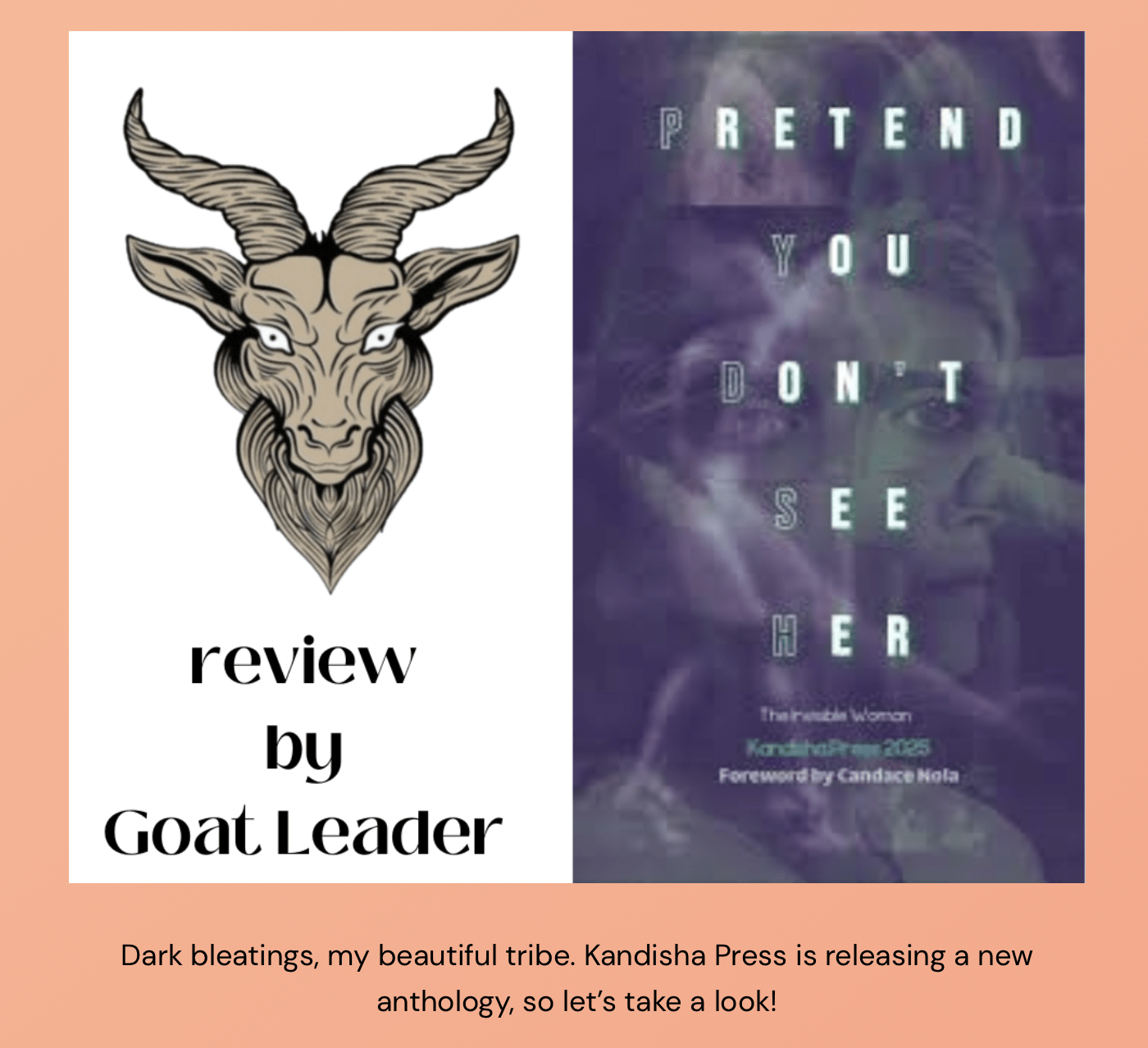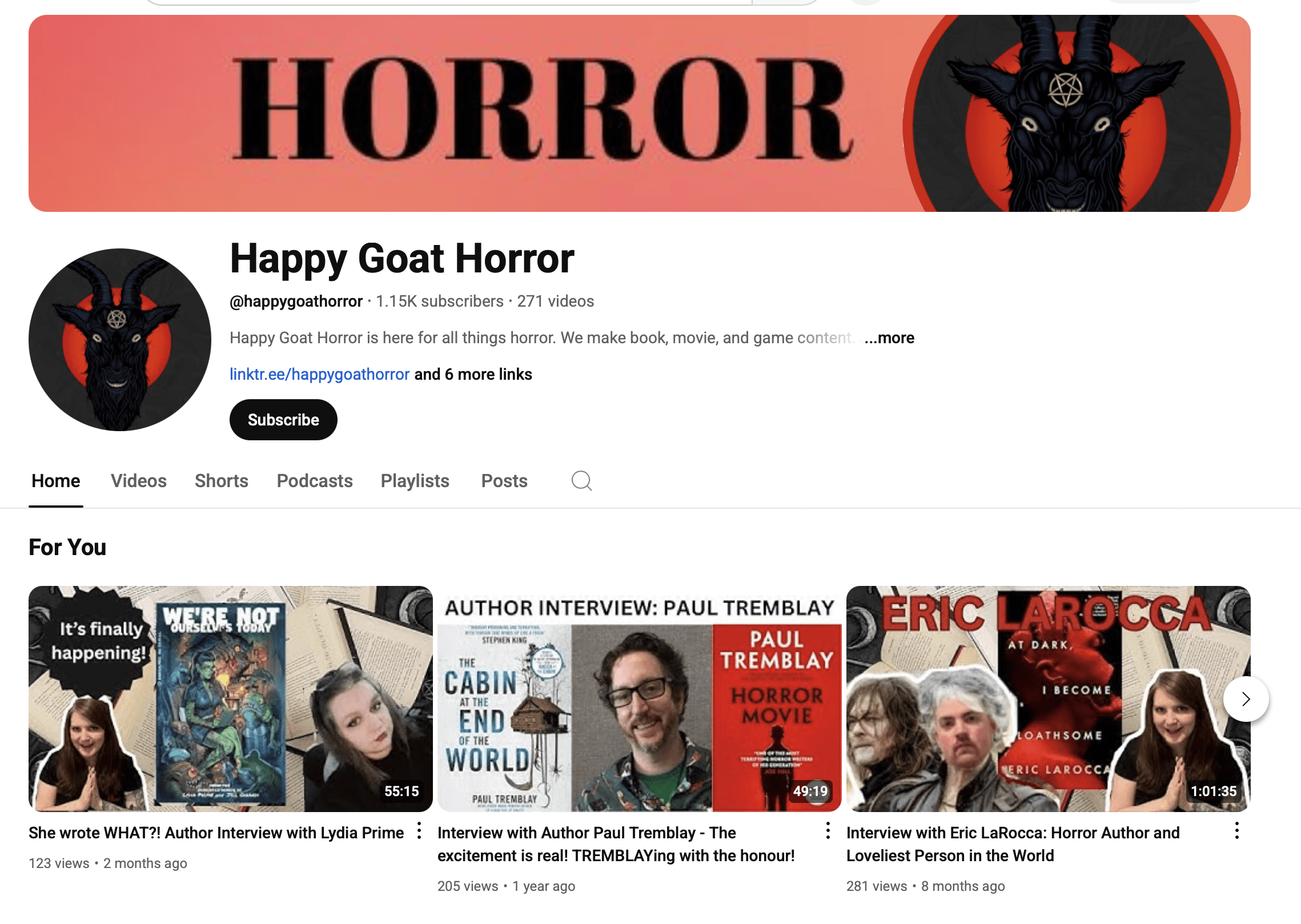In this monthly column, we pose your questions to an expert in a specific field of speculative fiction and the wider ‘industry’. This month, Kayleigh Dobbs of Happy Goat Horror answers questions about working with book bloggers and BookTubers, as asked by BFS members in our dedicated Discord channel.
This month: Working with book bloggers and BookTubers, with Kayleigh Dobbs

Name: Kayleigh Dobbs
Website: happygoathorror.com
YouTube: Happy Goat Horror
Specialism: Kayleigh is the founder of Happy Goat Horror, a website and YouTube channel focusing on supporting indie horror writers
Follow: Instagram @happygoathorror, TikTok @happy.goat.horror, Facebook @HappyGoatHorror
Kayleigh Dobbs (formerly writing as Kayleigh Marie Edwards) is a freelance writer, who lives in South Wales with her spouse and cats. She writes horror and comedy/horror, and is obsessed with zombies. She also runs Happy Goat Horror, a book review website and YouTube focused mostly on indie horror works and publishing. She spends most of her free time locked in her office, trying to get through her TBR bookcase.
What’s the deal with book blogging?
How/why did you set up Happy Goat? How long did it take you to grow your audience? Was it quick or did it take a lot of time and effort to get to where you are now?
I just wanted my own space to write book reviews and/or horror related articles, and basically just obsess about my interests. I actually bought the web domain about a year before I made it live, because my aim was to have one post per week and I wanted to make sure I was about a month in advance. I started the accompanying YouTube channel about 6 months after the website went live.
Happy Goat Horror just had its 3 year anniversary. I hit 100K visits on the website about two months ago, and hit 1K subscribers on YT around the same time, so all in all it’s taken about 3 years to build what I’d call a reliable following (a small but mighty one on YT, by YT standards, and I’m thrilled). The website figures are way beyond what I ever expected, considering horror is niche and indie horror (which is my main focus) is even more niche.
I think consistency was key for the website. I have posted every single Monday since launching, without fail (usually more, but that Monday slot is the one that I am obsessive about making sure I don’t miss).

I have no idea how any of it works, to be honest, so a proper idiot’s guide would be helpful. Do authors approach you or do you approach them? What are the common mistakes/annoying spam stuff that makes you go “Nope” immediately?
I review every horror book I read from my personal TBR, and outside of that, authors also submit reviews to the website. I have a review policy and contact information there. Generally speaking, I review every single book submitted, in the order they’re submitted (there are exceptions, like if I receive an ARC and I can fit it in before the release date).
There are a few reasons I might not review a book (I’ve only outright “noped” a handful, in the grand scheme of things). People not following my review policy, basically, is what puts me off, unless I’ve spoken to the author already and told them to go ahead and just send me something.
The main particular things that will automatically nope me out of reviewing a book are:
- Not providing the info I asked for in the policy
- Chasing me up asking if I’ve read the book yet after submitting a request
- Asking me to add something to my request list when the author knows I’m closed to requests
- If I see an author ranting on social media about negative reviews they’ve received elsewhere. That one is a huge nope for me because…what if I have criticisms? Will I be tagged and dragged over my review? I just don’t want the headache so I’ll just not risk it.
- If I see the author publicly posting things that don’t align with some of my morals. We don’t have to agree on everything for me to review your book, of course, but if for example I see an author posting something racist, then I don’t want to be associated with them and won’t be interested in reading their work.
Operations
How much time does it take / do you need to invest to maintain a blog and BookTube? It might be worth giving this answer both as a number and a percentage (i.e, how many hours, but also what proportion of your working hours are devoted to this aspect, and what kinds of things fill the rest of the time?)
Well I’m going to sound obsessed with Happy Goat Horror now, and that’s because I am. Currently, this is a hobby and so this “work” isn’t paid, but that doesn’t stop me from putting something like 20-30 hours per week into the website and the YT channel combined. Free time, who’s she?
Most of that is reading, but before I post a review I’m making graphics, doing a little research on the author/publisher to make sure I’m not accidentally promoting a bigot or something, and then writing the review.
YT videos are more time consuming because filming, editing, and uploading takes me forever – this is not a natural talent by any means, more of a painfully slow grind in every aspect – not to mention planning what to talk about.
If I count my goating activities as work and put them together with my actual day job working hours, I’d say they make up about 45% of my working week.
I have a books podcast and have a few related questions for you: How do you choose which books you cover? Is it only things others approach you with, or do you seek out your own? How do you find the time to read while having a life? How do you cope when you are not enjoying a book and know you have to finish it? What do you do when you don’t like a book? Have you ever been nervous about the response the author may give you? Questions, questions!

I basically just talk about all of the horror books I’ve read, whether they’re from my personal or request tbr. I quite often seek things out on my own, especially if there’s a video topic I want to cover (werewolves, for example).
Time to read is quite often difficult to find, depending on what’s going on, but it’s my favourite hobby and I prioritise it over other things I enjoy, like gaming for example, so I’m usually able to at least finish one book per week. It might be worth saying that I live like a hermit and hardly ever leave the house, so I’m not using my time for social activities very often!
I much prefer to love a book, but if I realise I’m not having the best time while reading something, my focus shifts onto what I can talk about in my review. I want to help promote as much indie horror as possible, but I won’t lie if I didn’t like a book, so I’m kind of reading through the lens of “how can I be true to my opinion AND fair to the author?” If I’m not loving a book, I’m looking for why, and what might have worked for me instead.
I’m not necessarily nervous if I post a more critical review…well, no, I’m lying actually. I’m always nervous. I’m also an indie author so I know that can suck. Also, I’m quite often friends with authors that are submitting review requests, and that is especially horrible for me if I have to write that their book wasn’t for me. I can only hope that they won’t take it personally and that the reviewer relationship is separated a bit from a friendship. The last thing I want is for people to think that I only post good reviews for my friends because they’re my friends – that doesn’t help me and it doesn’t help the authors either.
I have received a couple of emails from annoyed authors that weren’t happy with my review, and that’s fine, I just won’t review further work from them if I know they’re going to come at me. I’ve had people complain that I “only” gave them 4/5 stars, which is a bit baffling because I personally am thrilled with 4 stars!
Working with authors
How much are publishers working with external promoters vs authors engaging with you themselves (for trad pub authors)?
What a great question! Indie authors almost always approach me themselves, and a lot of the time we’re already following each other on social media, or we become followers of each other afterwards. I love making friends with authors, especially when I love their books.
Traditional publishers are a little bit different – a spokesperson for the specific author whose book they’re asking me to review is normally the contact, rather than a general marketing department. With the smaller offshoots of traditional publishing branches, I quite often receive general marketing emails from whoever is in charge of that department (it’s less personal and more of a ‘hey, if you want this book, respond to this email’ kind of deal).
Is it OK to approach bookstagrammers/booktokers/booktubers etc directly through DMs or is that considered wrong? I kind of want to approach people to offer a free eARC but I am not sure if that would be seen negatively?
Ooh, I see your hesitation because this is so personal depending on the reviewer. I prefer people to email me in accordance with my review policy, but if someone finds me through YT or IG or something (rather than coming across the website), I don’t mind getting a DM as long as the author is polite. I personally don’t see the harm, as long as you don’t keep following up if they don’t respond, just take a non response as a no.
If this helps at all, my day job involves marketing indie books, so I’m constantly reaching out to people asking for reviews, and I use what I’ve learned doing that for my own review requests for my own books. If you find a reviewer on a website, ALWAYS look for and follow the review policy, if they have one. If you find someone on social media, see if they have anything relevant in their bio (some people ask that you go to their website for requests, for example, and they’ll link it).

If they post a lot about books and review books but there’s nothing in their bio that lets you know either way if it’s okay to approach them, I just shoot them a message asking if they accept review requests first, and then if they respond that they do, I’ll go ahead and pitch or offer an Earc. Regardless of whether or not they take the book on, I always thank people for their time.
As a writer, is there anything we can do to make our books more reviewable? e.g. Does it help to have a cover that picks up well on video (and if yes, any tips for that)? But also is there anything less obvious than cover/logline/title? For example, does having reasonably frequent chapters allow reviewers to say things like “I won’t spoil what happens in/at the end of chapter 16, but it made me XYZ!”
Another great question! Uhhhh so this is personal to the reviewer, I suppose. In general, I strongly advise authors not to involve any creative/generative AI – so no AI book covers, for example. I’m not great at spotting them, but if I know AI has been used like that, I won’t go near the book.
For me personally, the likelihood of me talking about a book is more to do with the author than the book, which I know sounds weird. I can’t overstate the importance of being polite if you approach someone for a review, and also I think it’s important to be mindful of your social media conduct. When someone reviews your book, they’re also inadvertently associating themselves with you, the author.
In terms of how you write a book, I personally think you shouldn’t really consider how someone might review it, and just focus on telling your story the best way you can. That kind of passion and hard work shines through anyway. The books I talk the most enthusiastically about and am excited to make videos about are the books where creative choices were made in service to the story (for example, alternating viewpoints about the same event from two characters whose recollections don’t match – I love that kind of thing!).
One thing I will say about the book as a product that likely makes it much more reviewable is if it’s well presented. I’ve received ebooks that are basically unreadable because of the formatting, and I have to magnify the text so much that turning the pages is a chore, and for that reason I might bail on it altogether. I’ve also received paperbacks where the cover image must have been incorrectly sized, so it’s kind of distorted, or the text isn’t justified, there are no page numbers, things like that. All of that makes me not want to show the book to people because my aim is to help promote it, and if it looks bad, people will be put off.
If a book is beautifully presented, however, all nicely aligned and not full of typos, etc, I’m likely to rave about it, especially if it’s an indie or self-published work (if I liked the story, obviously). The sheer amount of work it takes to produce a good quality book is enormous so I will make mention of that when I see it’s done well.
YouTube

What are the differences between book blogging and making video reviews, beyond the obvious difference in medium. Is it easier or harder to gain followers in written or video format? Do you approach your reviews differently? Do you have specific rules for how authors or publishers approach you depending on whether they want a video or written review?
Oh my gosh, so 3 years in, I feel like I am just now learning how some of this works. I initially thought the website would basically be a thing of obscurity, and that YT might take off a bit quicker. I always see all over the place that people are more likely to watch/listen to something than read it. Numbers-wise, my website is performing significantly better than my YT channel.
I think I may have gained traction with the website quicker than YT, because I’m so focused on consistency on the website, and it’s taken me much longer to figure out what I can reliably do every week, in terms of videos.
My approach to the reviews is basically exactly the same, but my written reviews are likely more structured because I can read and rewrite those to make them more clear, and I don’t script my videos so those reviews are more an excited stream of consciousness.
I don’t have rules for people asking for reviews, outside of “please follow the review policy on my website”. Every book I read gives me a written review and video opportunity, so I will likely always do both. If it’s not a dedicated book review in video format, it’ll likely be a reading wrap up inclusion, or some sort of list inclusion.
I’ve been book blogging for about 12 years, and I’ve recently started considering adding YouTube but I’m intimidated by the process and possible equipment needs. Is it worth the extra work involved?
That depends on what you’re hoping to get out of it, I think. I was extremely intimidated when I started YT and it took me like 6 or 7 complete do-overs with my first few videos because I was nervous and rambling (I’ve since embraced my rambling, that’s just who I am lol). I just use my phone camera, and I edit on my phone with CapCut, which is free, and then upload directly to YT. I’m not great with technology. If you need any help, please DM me and I’ll share whatever I know!
For me, YT has been worth the extra effort because what I was really hoping for, in hindsight, was a little bookish community. I don’t have many friends in my in-person life who read, and even fewer that read horror, and basically none that read indie fiction. My YT channel has given me loads of opportunities to have conversations about books I wouldn’t otherwise get to talk about, and I’ve made several genuine friends through it. I don’t mind sharing that I’m a very socially anxious person and I often find social gatherings quite stressful, and I feel uncomfortable. YT has given me a more comfortable environment for socialising, and I’ve found so many like-minded people to form friendships with. For a while, I felt like I was just talking to myself, but that was still fine because I was raving about books and getting my thoughts off my chest.
The other thing that I’ve found is that other booktubers are lovely and supportive. Through making my own videos, I’ve found lots of other channels that I really like, and made friends that way too.
What’s the deal with bot accounts? Should I purge them from my followers, or let them be so it increases me count?
I’m so sorry but I’m not the best person to answer this because I’m not a tech savvy person and I don’t really know. I asked someone else who is more computer-y and he said you can just leave them if you care about numbers (or don’t care that some of the numbers are bots enough to go to the effort of purging them), but if you want to know the real size of your legitimately interested audience, maybe purge them.
Any tips on doing YouTube / social videos for those who hate being on camera?
Yeah, and this is going to sound weird, but my advice is just to not care that you’re on camera. Honestly, the only way to overcome that is to barrel through the discomfort. I know that’s easier said than done but I promise you, this will just gradually happen over time with the more videos you make.
I used to hate being on camera because I’m hideously (and hilariously) unphotogenic, and I had a complex about my massive moon head, my pie-shaped face, and my ghastly, corpse-like complexion. If you look at my first bunch of videos, you might notice that I was always wearing a nice, flattering top, much more make-up (which I’m bad at applying by the way, so what a waste of time lol), and I’d spend forever trying to hang some sort of backdrop. I was blinding myself with a ring light and giving myself headaches for the sake of not having shadows under my eyes from the overhead light.
I also think that my voice is pretty annoying. I do not have the dulcet tones that lulls one to sleep.
I’m not sure when it happened, but one day something snapped and I wore my pyjamas to make some videos, disposed of the ring light, and just went with my normal make up, which is just usually eyeliner and mascara. Gone were the cute little tops (that I had never once worn in real life, by the way). In short, I just started being my day to day self. I’m not knocking people who are beautifully presented on camera, but I absolutely hate doing my hair and makeup and it didn’t make me feel any more confident anyway.
In short, I was uncomfortable on camera because I’m uncomfortable with how I look and sound anyway, but over time that has just kind of gone away. I mean, I still have a giant moon head but now I find it hilarious, especially if I try to wear a hat. Being on camera stops feeling weird after you’ve made a few videos and got into a rhythm with it.
I didn’t mean to write such a “meeeee” answer there, I’m just trying to tell you I totally hear you with the camera discomfort, but I promise you if you just be yourself, that will fade and it will feel normal, and then you can really start having fun with it!
Read previous columns
Ask an expert
- August 2025: Websites for creatives, with E.M. Faulds
- July 2025: Anthologies, with Dan Coxon
- June 2025: Self-publishing, with AK Faulkner
- May 2025: Indie presses, with Black Shuck Books’ Steve J Shaw
- April 2025: Being a traditionally-published author with Adrian Tchaikovsky
- March 2025: SFFH artwork with Jenni Coutts
Ask an agent, with Laura Bennett:

